Equity
| What is equity? Equity is providing an individual the tools that they need to be successful, as opposed to just providing everyone with the same tools. 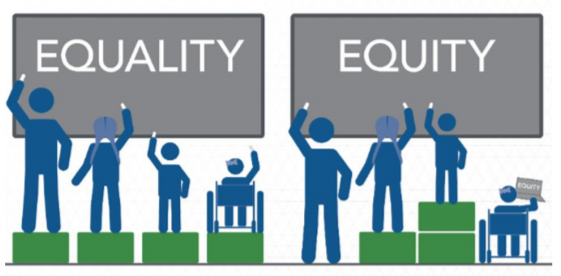 |
Equity is a foundational tenet in Perkins V and has been integrated throughout the Illinois State Plan for Perkins V. Illinois aims to place equity at the forefront of decisions made regarding CTE programming, acknowledging that opportunity and achievement gaps exist, especially for members of special populations. Perkins V affords Illinois the opportunity for an increased focus on meeting the needs of members of special populations by improving systems to identify and understand equity gaps, aligning resource systems, and providing professional learning to support the implementation of CTE programs that are accessible and effective for all students.
The following guiding principles, developed by the Equity and Access Committee of the Perkins V Stakeholder Work Group, serve as the foundation for reducing inequities in CTE:
- Illinois CTE will provide equitable access for all students beginning in fifth grade and continuing throughout their schooling with career exploration, career preparation, and academic and social support.
- Illinois CTE will provide targeted support services, informed by evidenced-based practice, for special populations in collaboration with secondary and postsecondary districts and community-based organizations.
- Illinois CTE will provide evidenced-based professional learning and resources to support programs in collecting and using data to critique and improve activities and services for those who are members of special populations, which will benefit all students.
- Secondary and postsecondary CTE will collaborate with community-based organizations, business partners, and families to build a partnership that supports our students, create programs that ensure equitable access and supports, create opportunities for work-based learning, and ensure access to high quality programming.
For a comprehensive summation of the equity provisions within Perkins V, visit this one pager created by the National Alliance for Partnerships in Equity (NAPE). Additional equity resources can be found on the Equity Resources page.
CLNA
What is the Comprehensive Local Needs Assessment?
Perkins V places concerted focus on long-term planning, and utilizing
comprehensive local-needs assessment (CLNA) moves beyond checklist types of assessment processes and instead aims to facilitate a data-informed, continuous improvement process for community colleges to biannually assess the extent to which their career and technical education (CTE) programs and programs of study are aligned with local workforce and economic needs. Using an equity lens, the CLNA requires disaggregation of data to highlight, analyze, and work toward closing equity gaps for underserved populations. The CLNA process also crosswalks Perkins V and the Workforce Innovation and Opportunity Act (WIOA) requirements for standards and examination of equity and access for specific student subpopulations (Perkins V). Community colleges are required under Perkins V to engage a diverse body of stakeholders in the CLNA process. The summation of findings from the Comprehensive Local Needs Assessment process are to inform school districts’ and community colleges’ development of their Perkins V local application for funding.
The CLNA is due on May 01, 2020, along with the local application.
Documents & Resources
- CLNA Word Version
- CLNA fillable template
- CLNA Guidance Document
- OCCRL CLNA webpage
- Informing Perkins V-Student Input Report
- Informing Perkins V-Employer Input Report
- 2020 OCCRL Academy Resources
- 2020 Equity Academy Centralia Slides
Fillable Comprehensive Local Needs Assessment Template
Postsecondary State Determined Performance Targets (draft)
Perkins V CTE Program Funding Requirements
Recorded Webinar– Illinois’ Perkins V State Plan
MOA Program
Illinois Postsecondary MOA State Plan
Purpose and Authority
Annually, the ICCB conducts a comprehensive civil rights review at two Illinois community colleges which 1. offer CTE programs and 2. receive federal Perkins funding. Throughout the review process, the ICCB interviews staff, faculty, and students, as well as conducts a review of a college’s facilities.
The purpose of the review is to ensure compliance with federal civil rights laws that bar discrimination on the basis of race, color, national origin, sex, and disability. The ICCB reviews compliance with the following federal civil rights laws:
- Title VI of the Civil Rights Act of 1964 [race, color, national origin]
- Title IX of the Education Amendments of 1972 [sex]
- Section 504 of the Rehabilitation Act of 1973 [disability]
- Title II of the Americans with Disabilities Act of 2010 [disability]
- The Vocational Education Program Guidelines
What gives the ICCB the authority to conduct these reviews?
Through the Methods of Administration (MOA) program, the United States Department of Education (USDE), Office for Civil Rights (OCR) is able to oversee the civil rights compliance programs of state agencies that administer CTE programs. As the administering of these programs is overseen by the ICCB, it is the responsibility of the ICCB to ensure this compliance on behalf of the OCR.
What is the MOA program?
The Methods of Administration program was developed by the USDE, OCR, to ensure that all students, regardless of race, color, national origin, sex, or disability, have equitable access to high-quality CTE programs. The guidelines for ensuring this access, as well as the responsibilities for administering agencies, are laid out in the Guidelines for Eliminating Discrimination and Denial of Services on the Basis of Race, Color, National Origin, Sex, and Handicap in Vocational Education Programs (Guidelines).
Selection Criteria
The ICCB utilizes specific selection criteria to determine which two colleges will be reviewed during the academic year. Points are assigned to each college based on the criteria and are then tabulated to determine the college’s rank. These criteria have been reviewed and deemed acceptable by the OCR. Points are assigned based on the following factors:
- disparities between total enrollment and CTE enrollment in the areas of race, sex, and disability; and,
- when, if ever, the college last received an on-site civil rights review.
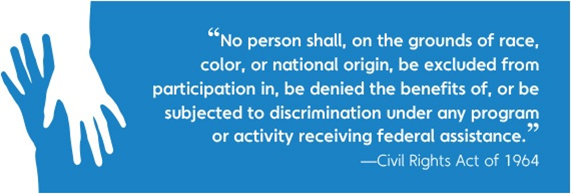
The ICCB conducts these reviews with assistance from the Illinois Center for Specialized Professional Support (ICSPS).
|
Other OCR Webinars:
|
|
The U.S. Department of Education today released its Final Rule under Title IX of the Education Amendments of 1972, which prohibits discrimination on the basis of sex in education programs or activities receiving federal financial assistance. In addition to posting the unofficial version of the Final Rule, the Department is releasing a Final Rule Fact Sheet, a Final Rule Overview, a document detailing the major provisions of the Final Rule, and a document highlighting changes between the prior Notice of Proposed Rulemaking and the Final Rule. Finally, the Office for Civil Rights has also released a Webinar describing the Final Rule and many of its features. The Final Rule is clear, predictable, and effective at ensuring schools have the tools they need to address incidents of sexual harassment in their programs and activities. Under the Final Rule, schools know the importance of responding to such incidents appropriately by supporting survivors, as well as by providing a fair, transparent process for investigating and adjudicating sexual harassment matters. The Final Rule will carry the force and effect of law as of August 14, 2020.
OCR Webinar: Title IX Regulations Addressing Sexual Harassment (Length: 01:11:29) 05/06/2020 |
Pathways to Results

Pathways to Results (PTR) is aimed at improving student transitions to and through postsecondary education and into employment. It empowers organizations to use methods, templates and tools to continuously improve pathways and programs of study by addressing inequities in student outcomes. Enhanced outcomes for students, programs, organizations, and systems is the ultimate goal of PTR. Outlined as follows are the four main goals of PTR:
- Improve career cluster-based Programs of Study planning and implementation using an inquiry- and equity-focused, continuous improvement process.
- Improve transition outcomes for under-served students, including groups of students who are racially and ethnically diverse, low income, low literacy, and first generation college.
- Align PTR to public policies dedicated to improving student transition to college and careers, including Carl D. Perkins, NCLB and High Schools that Work (HSTW), Titles I and II of the Workforce Opportunity and Investment Act (WIOA), and Integrated Career and Academic Preparations Systems (ICAPS).
- Improve access of PTR teams to data and tools that support evidence-based decision making and continuous improvement.
Pathways to Results Grant: the Pathways to Results grant is provided by the ICCB through Title I Perkins Leadership funds. The grant is managed by ICCB CTE staff in coordination with the Office of Community College Research and Leadership (OCCRL).
Phase One: Engagement and Commitment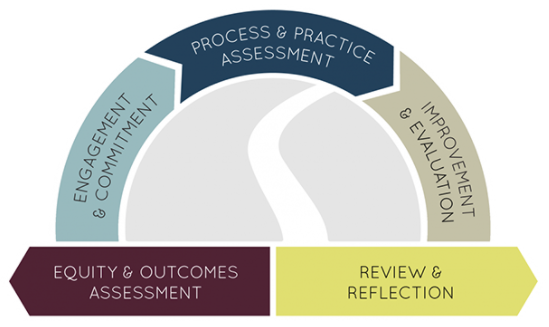
Phase Two: Outcomes and Equity Assessment
Phase Three: Process Assessment
Phase Four: Process Improvement
Phase Five: Review and Reflection
Navigating the first three phases of the Pathways to Results process:
Engagement and Commitment webinar
Equity and Outcomes Assessment webinar
Process and Practice Assessment webinar
Reserve
In accordance with Section 112 (c) of the Strengthening Career and Technical Education for the 21st Century Act (Perkins V), reserve funds can be awarded to the following recipients to 1. foster innovation through the identification and promotion of promising and proven CTE programs, practices, and strategies; and 2. promote the development, implementation, and adoption of programs of study or career pathways aligned with high-skill, high-wage, and in-demand occupations/industries.
- Rural areas
- Areas with high percentages of CTE concentrators or CTE participants
- Areas with high numbers of CTE concentrators or CTE participants
- Areas with disparities or gaps in performance
In order to address long-standing equity gaps in State of Illinois higher education, the ICCB determined that the opportunities to see the greatest change are in rural areas and areas with disparities or gaps in performance.
Below is the information to submit your application for the FY2022 Perkins Reserve funding. Please note that this funding is based on a formula allocation and is not competitive.
- Applications must be submitted by June 25, 2021, to ICCB.cte@illinois.gov.
- Only the institutions below are eligible to apply. See the NOFO for additional details.
- NOFO and Application
- Uniform Budget
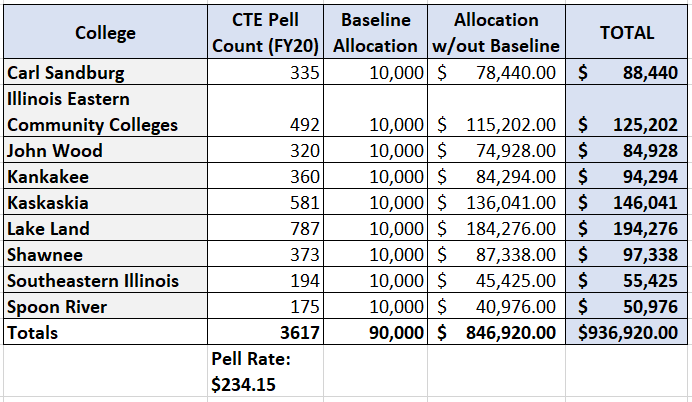
Resources
Harper College Professor Wins Faculty Innovation Award
Harper College’s own Dave Braunschweig, professor of computer information systems, has won the Faculty Innovation Award for the American Association of Community Colleges’ 2020 Awards of Excellence for his work helping to save students more than $1 million in textbook costs.
OCCRL Publications-
Advancing Equity in Career and Technical Education
Foster Youth and Basic-Needs Insecurity
Assessing Racial Campus Climate
The Forgotten Students: COVID-19 Response for Youth and Young Adults Aging Out of Foster Care

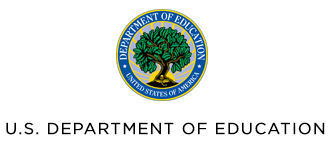 The Office for Civil Rights’ (OCR) Center for Outreach, Prevention, Education, and Non-discrimination (OPEN Center) today launched a short webinar entitled “How to File an OCR Complaint.” This short webinar describes who can file a discrimination complaint with OCR, the four ways in which one can file a complaint, and the type of information that must be provided in the complaint. This is the sixth webinar launched by OCR, all of which are available on OCR’s website under Technical Assistance.
The Office for Civil Rights’ (OCR) Center for Outreach, Prevention, Education, and Non-discrimination (OPEN Center) today launched a short webinar entitled “How to File an OCR Complaint.” This short webinar describes who can file a discrimination complaint with OCR, the four ways in which one can file a complaint, and the type of information that must be provided in the complaint. This is the sixth webinar launched by OCR, all of which are available on OCR’s website under Technical Assistance.